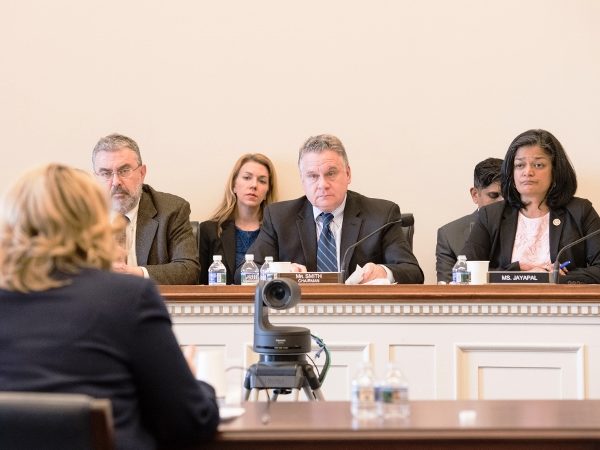Congressman Smith calls on President Trump to bring abducted children home

Congressman Chris Smith listens to Patricia Apy, a Red Bank attorney, testify about the need for the State Department to step up the enforcement of the Goldman Act
While most of Washington and the media was focused on why you see the ads you see on facebook yesterday, Congressman Chris Smith and his colleagues on the House Subcommittee on Global Human Rights were focused on reuniting kidnapped children with their American parents.
Smith, as chairman of the committee, called on the Trump administration to step up where the Obama administration failed by imposing sanctions on countries that are not enforcing court orders, including from their own courts, for families suffering from international parental child abduction.
“Congress unanimously adopted the Goldman Act in 2014 to ensure that the U.S. government and foreign governments would prioritize the return of abducted American children,” said Rep. Smith, who authored the Sean and David Goldman Child Abduction Prevention and Return Act of 2014 (P.L. 113-150). That law was named after a Tinton Falls, New Jersey father and son who were reunited after the father’s, David, five year-long battle to regain custody of his son Sean who was unlawfully abducted to Brazil by his mother.
“While the law has resulted in fewer new abductions, the last Administration failed to use it to resolve the current, long-standing, egregious cases—and the return rate remains abysmally low,” Smith stated at Wednesday’s hearing. To read excerpts of Chairman Smith’s opening remarks, click here.
Witnesses at the hearing stated that Japan has been notorious for non-compliance and non-enforcement of court rulings on the safe return of children to their home countries. In Japan, 35 children await reunification with their American parent—most of these cases have been pending for 5 or more years. Dozens more children have aged-out of the process without the courts acting to order their safe return.
Patricia Apy, an international family law practitioner in Red Bank, NJ, testified that, “MOU’s, bilateral agreements and diplomatic sanctions must be seen as part of an arsenal available to the Department of State to address the unique legal and cultural framework of international family law. American families need to have accurate and transparent information regarding the objective obstacles to recovery of children.” To read Apy’s full testimony, click here.
In February 2016, James Cook—who has four children abducted in Japan—won his case in Japanese courts to have his children returned. However Japan failed to enforce the return order or the fines against the taking parent for over a year. The Osaka High Court overturned the return order because never ending legal bills forced Cook to move to an apartment.
“Mr. President, when you meet with President Abe next week, demand my children back,” Cook stated in his testimony. He went on to warn U.S. courts, “I ask the U.S. Judicial branch to heed my testimony when contemplating joint custody arrangements between U.S. and Japanese parents, and certainly any considerations of…travel outside of the USA. There is no such thing as a harmless vacation to Japan.” To read Cook’s full testimony, click here.
Suzanne Lawrence, Special Advisor for Children’s Issues at the U.S. Department of State, acknowledged Japan’s systematic enforcement problems, stating “In 2017, we had two cases in Japan that were unresolved for over twelve months as a result of the failure of Japanese authorities to enforce return orders. This is unacceptable and I am deeply concerned that, as a result, there is a pattern of Japan not complying with its obligations under the Convention.” To read Lawrence’s full testimony, click here.
Eleven of the thirteen countries found to be non-compliant in the return of abducted American children, in the 2017 Goldman Act Report, are currently receiving billions of dollars in tariff exemptions under the Generalized System of Preferences. “Why are we giving business visas and tariff benefits to countries that aid and abet abductors?” asked Smith on Wednesday.
According to State Department statistics, nearly 800 children await resolution of their abduction cases, with several hundred being abducted each year, and approximately 11,000 American children suffering an international parental child abduction since 2008.
“Child abduction is child abuse—and still the State Department responds with nothing but more meetings and more letters despite having the tools and mandate for action in the Goldman Act,” said Smith.
The Goldman Act calls on the State Department to respond first by naming a country as “non-compliant” in the annual Goldman Act Report and then by taking action, including delay or cancellation bilateral working, official or state visits; withdrawal, limitation, or suspension of U.S. development, security, or foreign assistance; extradition, and any other leverage the State Department devise.
“Japan is without question ‘non-compliant’ per the Goldman Act,” said Smith. “The problem of systematic non-enforcement of court orders is so bad that 26 European countries wrote to Japan last month, asking for it to fix the problem.”
More than 90 abducted American children are currently being held in India. In many of the cases, both the parents and the children are American citizens, and yet the taking parent runs to Indian courts to resolve custody—or ignore a pre-existing U.S. court decision on custody—when they could have easily used U.S. courts and not harmed the child through abduction.
Rep. Smith has introduced Bindu Philips and Devon Davenport International Child Abduction Return Act of 2017 (H.R. 3512) to amend the Generalized System of Preferences system so that any country named as non-compliant would lose their trade benefits. Rep. Smith is also developing new legislation that will limit the number of H1-B and other business visas available to countries that persistently fail to quickly resolve abductions of American children.










